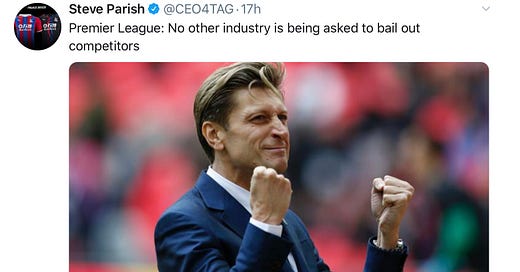Steve Parish or Jon Colman, pick a side and you can’t say ‘both’
Football and economics are the topic. And as in every culture war, you’re invited to pick a side.
Steve Parish builds on Sean Dyche’s hedge fund analogy to flesh out the Premier League owners libertarian view of the world. He didn’t say ‘We’re all Austrians now’ but it’s implied.

So we’re in ‘trickle down’ territory, a flawed idea that underpinned Reaganomics in the 1980s and has its roots in the 1920s, coined by humourist Dan Rogers:
They [Republicans] didn’t start thinking of the old common fellow till just as they started out on the election tour. The money was all appropriated for the top in the hopes that it would trickle down to the needy. Mr. Hoover was an engineer. He knew that water trickles down. Put it uphill and let it go and it will reach the driest little spot. But he didn’t know that money trickled up. Give it to the people at the bottom and the people at the top will have it before night, anyhow. But it will at least have passed through the poor fellow's hands. They saved the big banks, but the little ones went up the flue.
Presidential speechwriter Samuel Rosenman wrote:
The philosophy that had prevailed in Washington since 1921, that the object of government was to provide prosperity for those who lived and worked at the top of the economic pyramid, in the belief that prosperity would trickle down to the bottom of the heap and benefit all.
Only problem: it doesn’t work.
It was left to Jon Colman to voice the Keynesian view.

There’s a reason that Colman gets the regional gong at the Sport Journalist Association every year:
This is relevant once more at a time the Premier League are being asked to help those clubs to keep breathing. The medicine, up to press, is not forthcoming. It might be eventually, but the sense right now is of a favour being prised from hands.
Some reports say the EFL must support demands on post-Brexit player quotas before the top-flight will pony up, some speculate that it will hinge on what the Government says about allowing fans back. Other caveats may be involved, and we can probably take a solid guess at them.
“We’re not in a great position, because our back is up against the wall,” admitted Carlisle’s John Nixon, an EFL director. One hates to be cynical – then again, this is football, so what other option do we have? – but it does seem like the motto for this time of existential crisis is: What’s In It For Us?
An EFL executive bold enough to stand up at this point – and not many will, the relationship now being somewhere between master-servant and pigeon-statue – would be right to ask in return: what else could you possibly want? You’ve got most of it already!
Go to Fynn for longer term context
Listen to our podcast with Alex Fynn, on where football’s pyramid scheme went wrong. The former Saatchi and Saatchi adman turned author played influential roles at two pivotal moments in football’s recent history. In the 1980s Alex was commissioned by the FA to write a blueprint of the Future of Football, a document that ultimately led to the formation of the Premier League. It was a piece of work that caught the eye of Silvio Berlusconi, then owner of AC Milan among many other things, who asked Alex to write a similar plan to reorganise European club football.
Perhaps there’s a fundamental difference in the product (one of the banned words when discussing football, along with brand) and what the Premier League offers meets different needs to the game in the lower reaches of the EFL and National League.
Jonathan Liew touches on the limitations of the sport-as-entertainment trend here:
Perhaps this was inevitable once we began to recondition the entire concept of football around escapism and mass entertainment, discarding all its alternative meanings in the process. Football, the employer. Football, the glue and the pride of small towns. Football, the nice day out.


